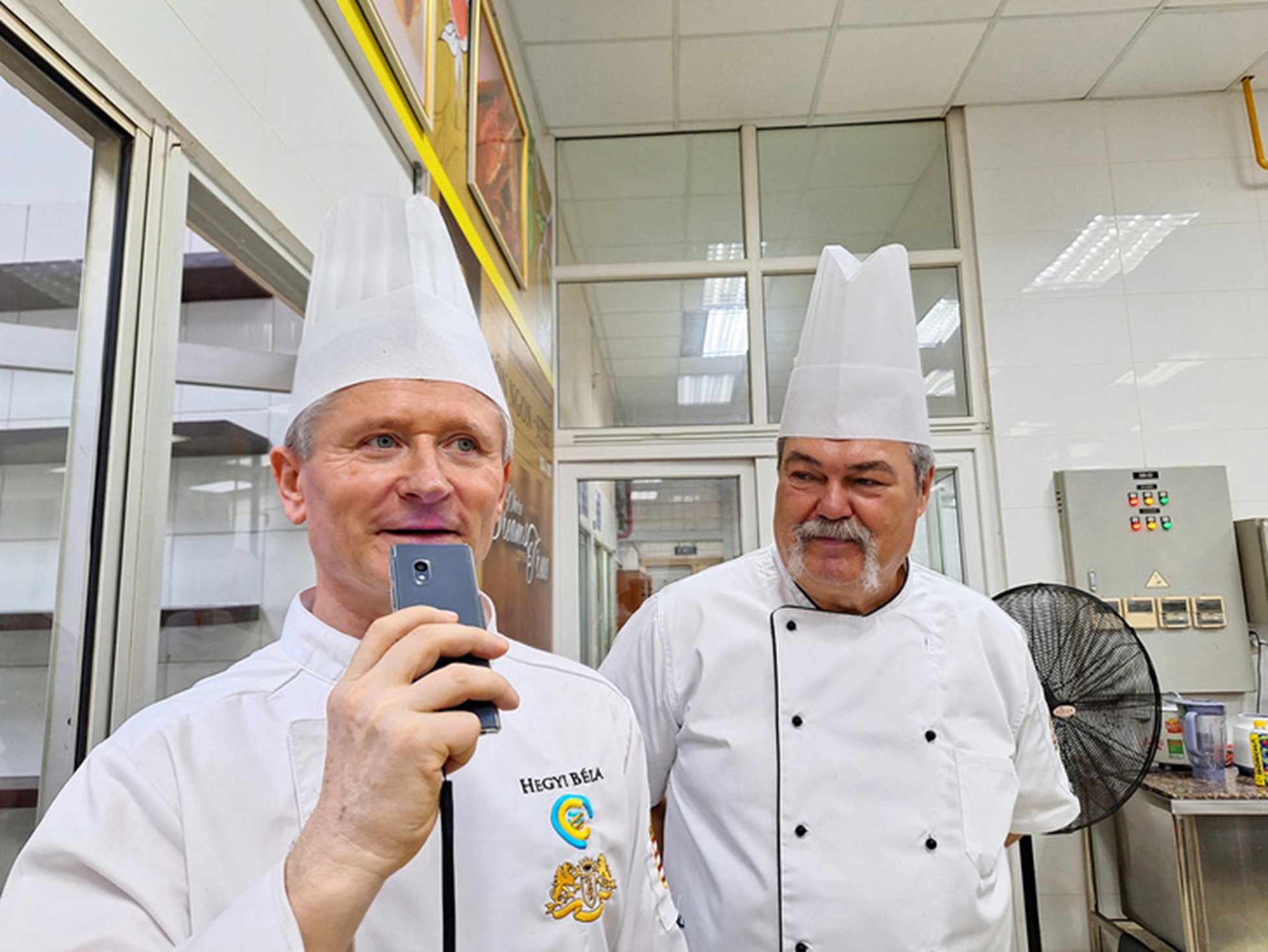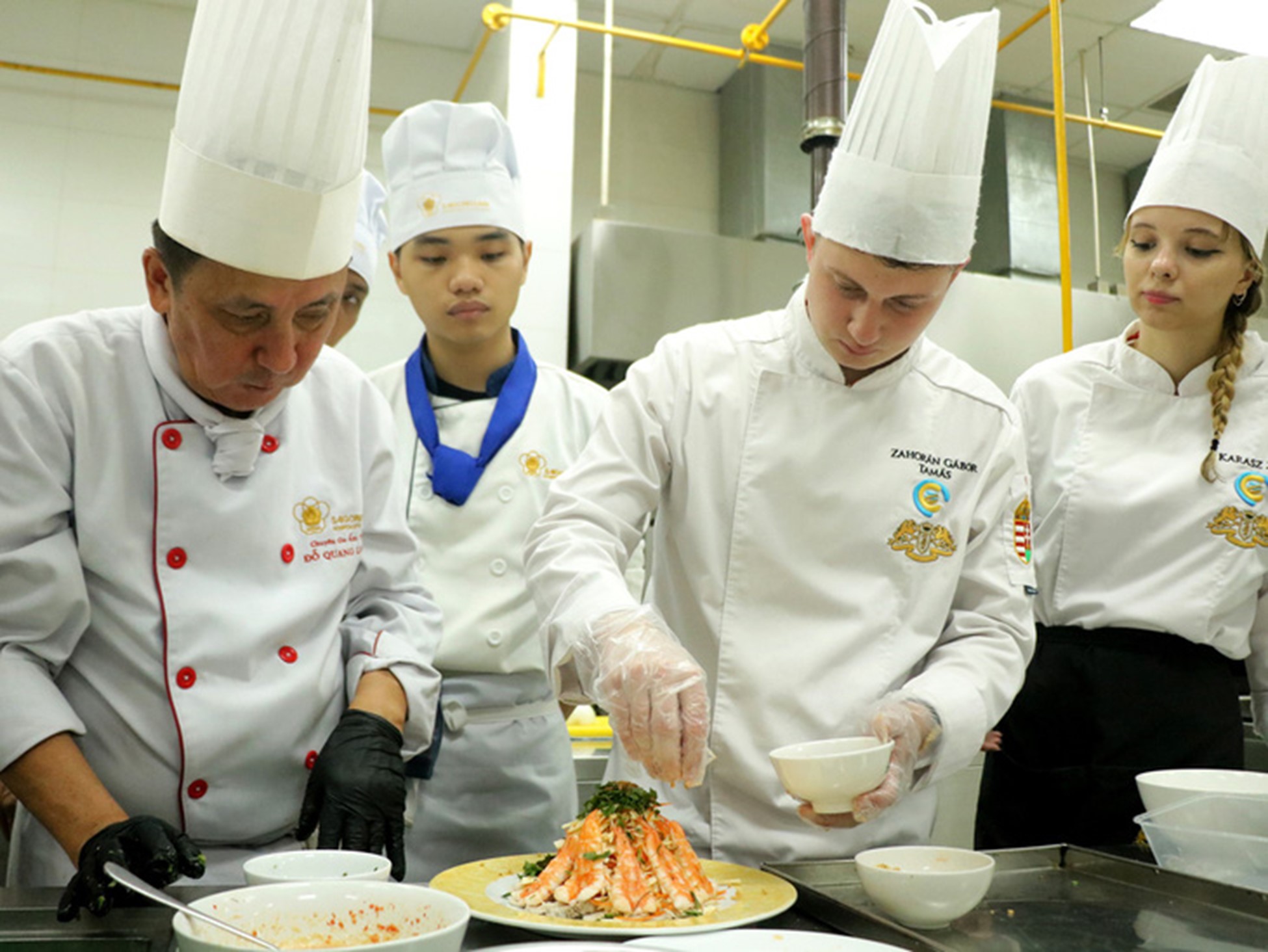Four students and two teachers from Hungary’s Békéscsaba Center of Vocational Training are undergoing a three-week internship, which began last month, at the Saigontourist Hospitality College (STHC) in Ho Chi Minh City, where they are learning the art of preparing Vietnamese dishes.
The program was launched following a recent cooperation agreement between the Hungarian vocational center and the STHC, member of Saigontourist, a leading tour operator in Vietnam.
During their professional practice program scheduled for March 20 to April 10 at the STHC, the Hungarian students and teachers have participated in culinary classes alongside Vietnamese students almost every day.
In a post on its Facebook page on March 22, Békéscsaba Center of Vocational Training wrote, “The learners settled in quickly, as they were welcomed by a friendly atmosphere and helpful students and teachers.”
In each session, Vietnamese instructors and chefs have taught all the trainees a new dish, from popular items such as pho – a Vietnamese soup consisting of broth, rice noodles, herbs, and meat, usually beef or chicken – kebab rice noodles, spring rolls, and seafood hotpot, to strange dishes like stir-fried goat with galangal, steamed bantam chicken with fish sauce, and soft-shell crab with X.O. sauce, to name a few.
Zahorán Gábor Tamás, one of the four Hungarian students, said that leaning to make Vietnamese dishes is a unique experience for him because of the remarkable differences between the gastronomies of the two countries.
For instance, Tamás remarked that Vietnamese dipping sauces are typically crafted with more intricate methods compared to Hungarian counterparts.
He further noted that initially, he struggled to replicate the flavors of the Vietnamese sauces, unsure of how to balance salt, sugar, and fish sauce to match the teachers' combination.
Tamás expressed his greatest enthusiasm when learning to prepare seafood dishes featuring shrimp, crab, and snails, which are not commonly found in Hungary, a landlocked country.

The trainee joyfully mentioned that he received training in handling live crabs for the first time to prepare crab-related dishes.
Karasz Zóra, another Hungarian student, expressed her surprise at discovering that many Vietnamese dishes are significantly spicier compared to the taste of Hungarian cuisine.
Pepper and chili are used a lot in salads, stir-fries, and hotpots in Vietnam, Zóra said, adding that almost every Vietnamese dipping sauce has a little chili.
Zóra admitted this is her first experience learning culinary techniques from a foreign country as distant as Vietnam, where street foods offer a diverse array of flavors, from which she has gained valuable insights.
Hegyi Béla, manager of the food & beverage (F&B) department of the Békéscsaba Center of Vocational Training, and Horváth Ferenc, a kitchen teacher of the center, have joined the training with their four students so far.
As they are not good at English and do not know Vietnamese, they have used translation machines over the past days to make it easy for them in communicating with the Vietnamese teachers and students.
The two experts said they could learn all the details in each lesson with the Vietnamese instructors thanks to these machines.
They also took photos and filmed the classes as training materials.
Ferenc said his Vietnamese food favorites included seafood dishes and beef and chicken pho.
Vo Thi My Van, principal of STHC, mentioned that her school and the Hungarian partner recently initiated academic exchange activities earlier this year.
Following the internship course of the Hungarian group, a delegation from STHC will travel to Hungary in September for a similar program, Van confirmed.
She added that these international exchange activities will offer students practical learning opportunities and pave the way for potential employment in Hungary specifically and European countries in general after graduation.
Like us on Facebook or follow us on Twitter to get the latest news about Vietnam!



















































